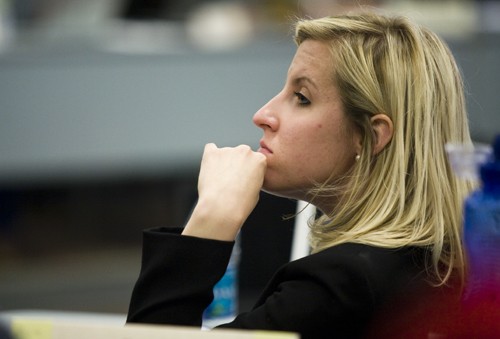The UA Faculty Senate publicized its official statement of opposition to a proposed Arizona gun law, Senate Bill 1467, at its Monday meeting.
S.B. 1467 states that no governing board of an educational institution could adopt or enforce a policy that prohibits the possession, transportation or storage of a concealed weapon by a person who has a valid permit.
The senate’s statement says that it “”vehemently opposes”” the bill, because the bill could place everyone on campus at “”significantly higher levels of risk of bodily and psychological harm.”” In the statement, senate members argue that the bill, if approved, would deprive governing boards of authority and academic freedom to make prudent judgments about whether students, faculty, staff and visitors are permitted to possess, transport or store a concealed weapon.
The statement was dispersed Monday, and about 500 UA faculty members have already signed in support of the statement, according to a speaker at the meeting.
Faculty senators agreed on the importance of student and faculty attendance of the “”Learn Without Concern: A Public Forum on Concealed Weapons on Campus”” on Wednesday, and said it will be important to educate students and the community about proposed gun legislation.
They also agreed that showing both sides of the argument during the forum would be “”absolutely appropriate,”” saying that if there are potential beneficial aspects of the proposed legislation, they should be voiced.
The senate also approved a measure to amend the second language requirement for international students, which now allows an endorsement from the Center for English as a Second Language to satisfy the second language requirement as an alternative to passing the Test of English as a Foreign Language or the International English Language Testing System.
Previously, students were required to take one of the standardized tests.
The requirement was amended because some students whose second language is English struggle with standardized tests, yet they attain advanced levels in CESL’s curriculum. This indicates the same level of proficiency, according to the approved amendment.
Graduate and Professional Student Council President Emily Connally asked the senate to join GPSC in the effort to create transparency regarding university budget cuts and fee increases. She explained that GPSC members were frequently faced with questions from constituents regarding annual fee and tuition increases and which programs will be cut. She asked for continually updated data about student costs in order to help students reasonably predict their futures upon enrollment at the UA.
“”We want to know what the enduring ramifications are of decisions made in crisis,”” Connally said.
She explained that if a student enrolls in, or graduates from, a program that is later cut, his or her degree could hold less significance, and therefore the student deserves to know university funding for that program ahead of time.
When asked by Wanda Howell, a nutritional sciences professor and chair of the Faculty Senate, if she really wants to know what programs will be cut or eliminated, Connally said, “”Yes.””
Provost Meredith Hay explained that the UA follows the Arizona Board of Regents policy in regards to cutting programs. Hay also said that, unlike cutting faculty, getting rid programs is not what saves the university money.
“”Most of our expenses are tied up in payroll,”” said Hay. “”It (cutting programs to save money) is a false premise.””









